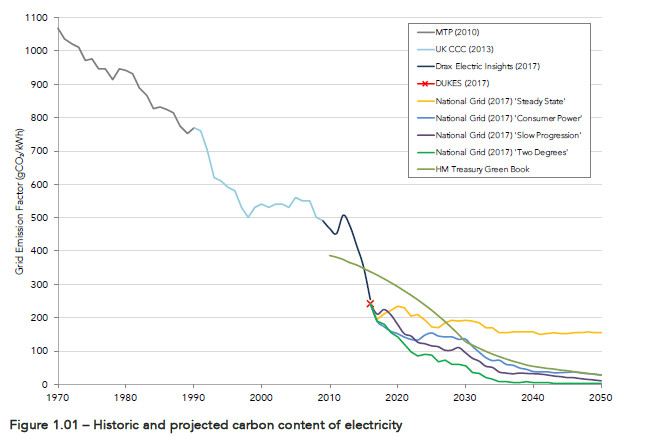Low Carbon Heat
Heat Pumps in London
The Greater London Authority has commissioned a study into the implications of a widespread uptake of heat pumps in London's new developments, driven by the decarbonisation of the electricity grid.
You may not have time to read the full GLA report published in September 2018 "Low Carbon Heat: Heat Pumps in London" which runs to 142 pages.
The principal conclusions are summarised here:
- Heat pumps are likely to play a growing role in the delivery of low carbon heating, both as part of low carbon heat networks and as building-only heating systems. New buildings offer an opportunity to generate faster changes in the market for this type of low carbon heating.
- When applying an up-to-date carbon factor for electricity, heat pumps provide substantially lower carbon emissions than gas-based heating or direct electric. The electricity carbon factor is projected to decrease steadily.
- In order to deliver low carbon affordable heat, the efficiency of heat pumps needs to be better understood by the building industry. The use of low temperature distribution emitters, the method used to generate domestic hot water and the correct installation and commissioning of heat pumps can all help to deliver low carbon emissions and lower energy costs.
- Maintenance costs can form a substantial part of overall heating costs in new developments and should be included in any evaluation of running costs of heating. Efficient heat pumps offer cost competitive heating.
- The capital costs of heat pumps are likely to be slightly higher than a 'business as usual' heating system with central gas boilers and a gas-fired CHP. A number of developments with heat pumps demonstrate that heat pumps are already commercially viable.
- Additional capital costs compared with 'business as usual' are likely to be small in comparison to the total project costs and should be seen in conjunction with their potential benefits including carbon saving and air quality improvements.
- The impact of heat pumps on space and noise depends on the heat pump type and it requires consideration on a project-by-project basis.
- The majority of refrigerants currently used in heat pumps have a high global warming potential and can present other risks. Regulatory frameworks are in place to address these concerns and the industry is working to mitigate these risks.
- Key considerations for a wider uptake of heat pumps include mechanical design (particularly supply temperatures and Domestic Hot Water provision), architectural integration, installation quality, commissioning and maintenance. More work is required to ensure that they will not have unintended consequences, but none of these considerations is thought to be a significant barrier. Heat pumps can also have the advantage of being 'smart grid' ready – they represent a demand side management opportunity.
- Heat pump suppliers would be able to meet an uptake in demand, as they supply other European countries with much higher volumes of heat pumps.
Air quality is also a key driver
A significant benefit of heat pumps over conventional boilers and gas-fired CHP is that there is no combustion involved (combustion of gas emits nitrous oxides). Beside the direct advantages (safety), technical advantages (no need for flues) this is very beneficial for cities like London with poor levels of air quality.
Alternative forms of low carbon heating
The Study also considers alternative forms of low carbon heating including direct electric heating, which has a significantly higher running cost; and the burning of hydrogen which emits no CO2 at the point of combustion.
However, upgrading the gas grid to contain very small hydrogen molecules would incur a huge national cost and upgrading all the boilers to burn hydrogen would also be a significant task. Production of hydrogen by steam methane reformation, which uses high levels of heat to crack methane into carbon and hydrogen, emits large volumes of CO2. This would require the development of economic Carbon Capture and Storage to achieve carbon neutrality.
Hydrogen can also be derived from electrolysis powered by renewable electricity, although the overall efficiency would be less than 70% before accounting for distribution losses, compared to an efficiency of well over 350% for a typical ground source heat pump.
It is clear from the Study that the only practical route to heating without CO2 emissions is to avoid combustion. The alternative is to use heat transfer: which means using heat pumps. There is no need to search for esoteric alternatives when tried-and-tested heat pumps are available now.
The full report published in September 2018 "Low Carbon Heat: Heat Pumps in London" runs to 142 pages.


